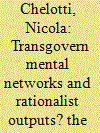| Srl | Item |
| 1 |
ID:
099793


|
|
|
|
|
| Publication |
2010.
|
| Summary/Abstract |
The remarkable increase in European security and defence integration in the past decade has presented a challenge to traditional integration theories. Although they remain relevant, these theories fail to take full account of the changing security architecture of Europe, which includes the rise of transgovernmental networks (TGNs). With a focus on EU civil protection, this article critically examines established definitions of TGNs and investigates how these networks influence the supranational and national levels of security cooperation. Findings point toward the emergence of an alternative form of European security governance that addresses the lack of authority in EU security policy.
|
|
|
|
|
|
|
|
|
|
|
|
|
|
|
|
| 2 |
ID:
148319


|
|
|
|
|
| Summary/Abstract |
The European Union (EU) foreign policy has gone beyond intergovernmentalism. It is largely formulated by (Brussels-based) national officials, in a process characterised by a high number of cooperative practices, diffuse sentiments of group loyalty and possibly argumentative procedures. Yet, in many cases, the most likely output of this process reflects the lowest common denominator of states’ positions or the preferences of the biggest states. The article intends to investigate this puzzle. In the first part, it corroborates its existence by using answers from an original database of 138 questionnaires and 37 interviews with EU negotiators. Next, it argues that cooperative practices remain often subordinated to nationally oriented ways of doing things. Consequentialist practices perform an anchoring function, in that they define the parameters around which (social) practices operate. The last section looks more closely at the sites of and meanings attached to EU foreign policy-making. By discussing national diplomats’ conspicuous leeway in Brussels, it also argues that negotiating practices are performed through a mix of partial agency and persistence of national dispositions. On the whole, changing practices is difficult, even in dense and largely autonomous settings such as EU foreign policy. The social construction of EU foreign policy occurs only to a partial extent.
|
|
|
|
|
|
|
|
|
|
|
|
|
|
|
|